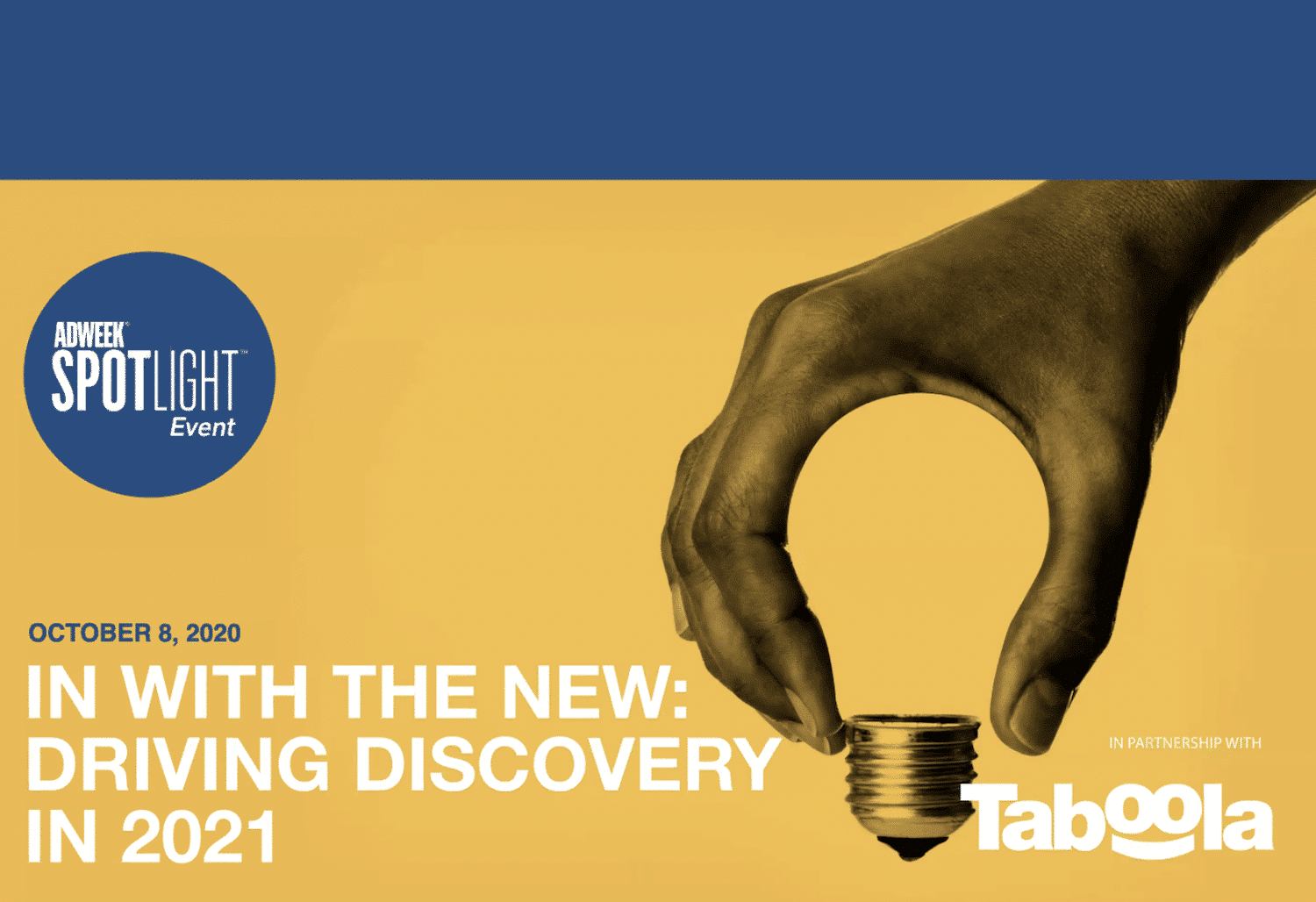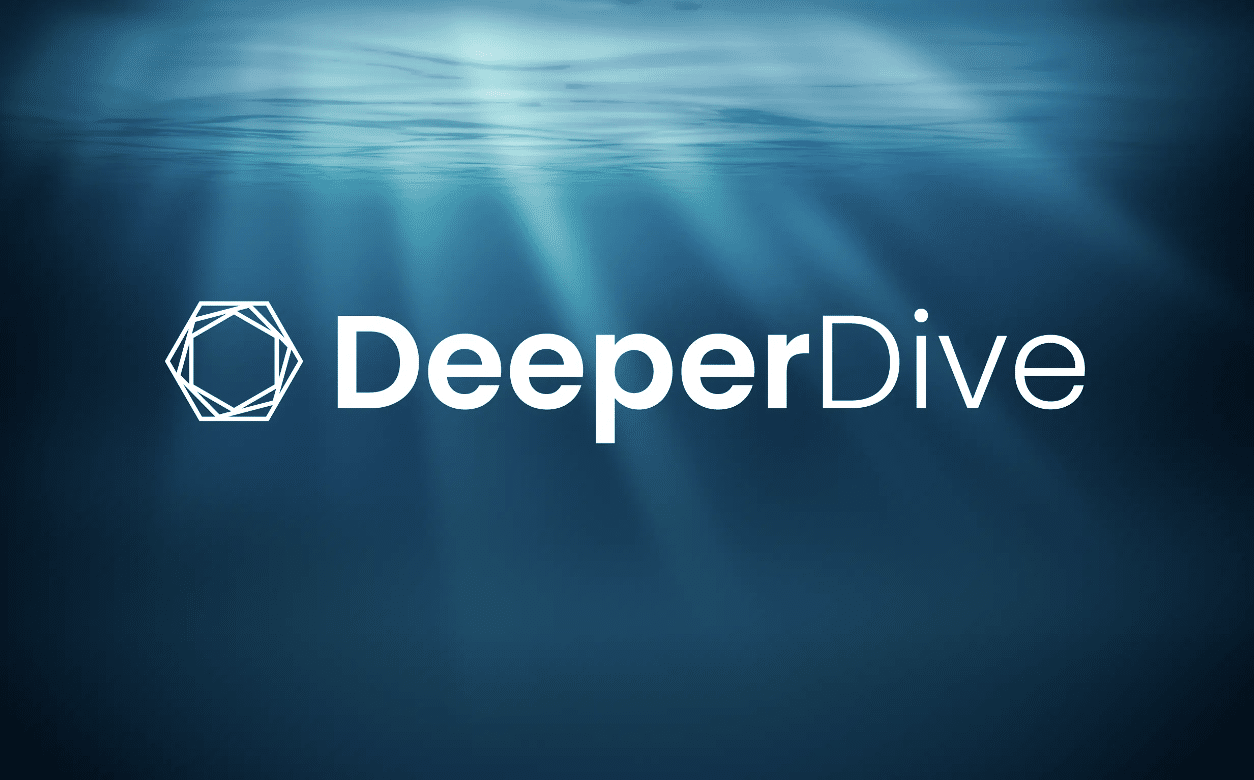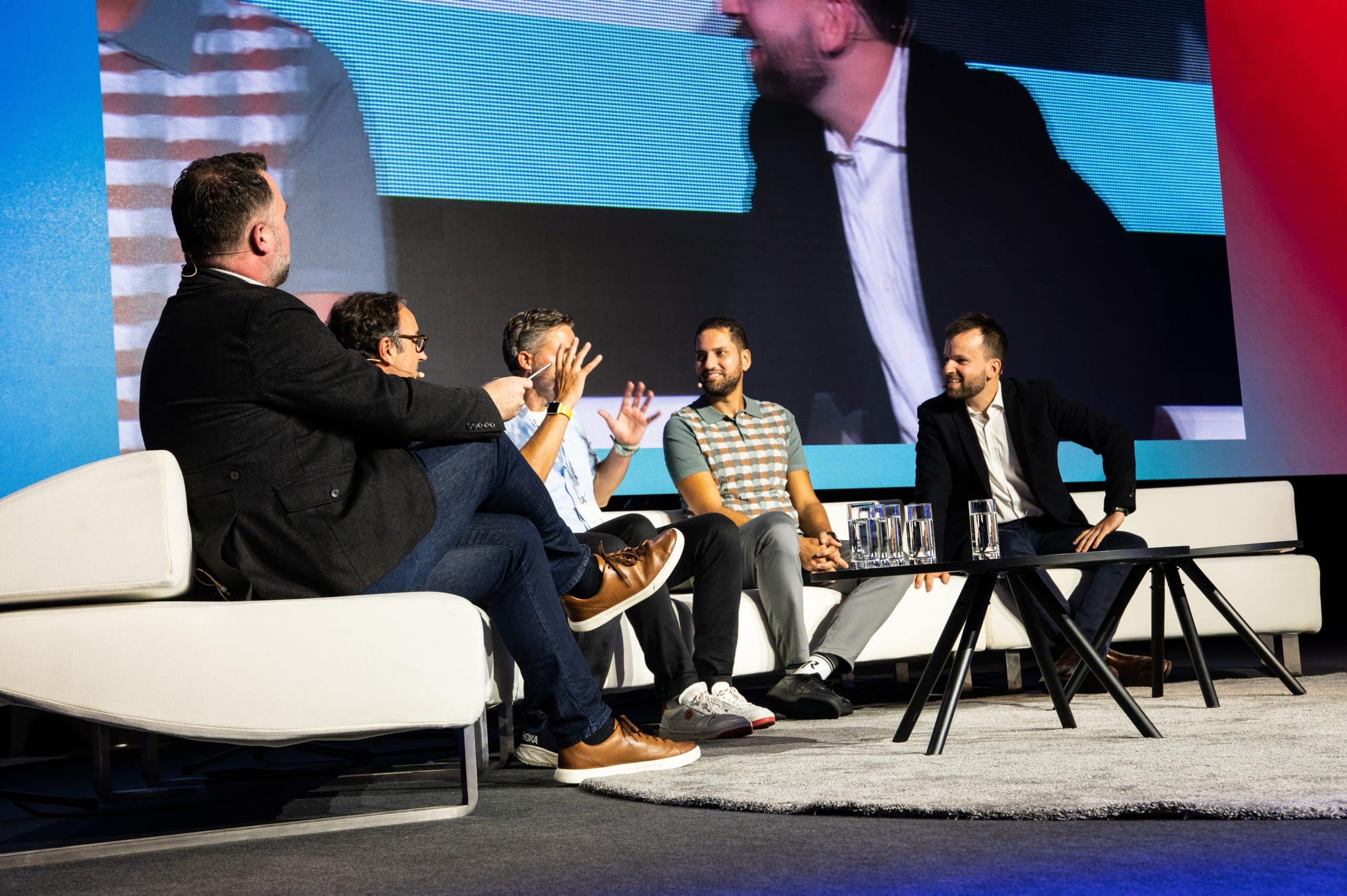It’s 2020, and Adweek’s Chief Brand Officer Danny Wright sets the scene. Although we’re all on Zoom now, he reminisces on the past events Taboola and Adweek have shared, including one at Frank Sinatra’s house in Palm Springs (feels like a time we really had the world on a string).
But, as the walk down memory lane comes to a close, and it’s clear we’re still in this virtual world for now, Wright introduces Stephanie Paterik, Executive Editor at Adweek, for a panel that answers a question we’ve all been wondering lately.
Is it 2021 yet?
Well, is it? Not quite yet, but just talking about plans for it makes it feel closer. Paterik is joined by a panel comprised of:
- Jennifer Brockington: Senior Director, Consumer Strategy, Research and Acquisition at Ally Financial
- Amanda Goetz: Vice President of Marketing at The Knot Worldwide
- Anna Faktorovitch: Senior Vice President of Marketing at CAVA
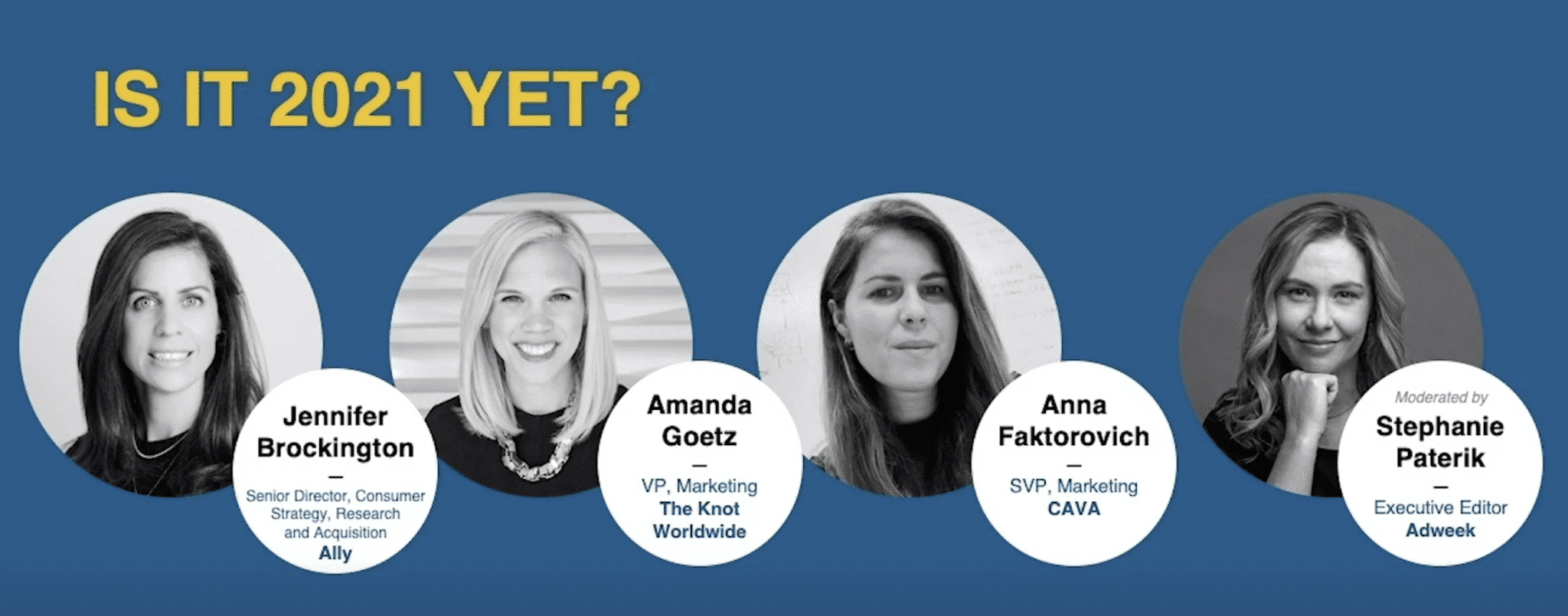
The First 24 Hours of The Pandemic
To kick things off, Paterik zoomed in on that initial moment of disruption when the pandemic first hit, asking each panelist what those first 24 hours were like for them professionally.
Goetz, sharing first, gave a glimpse into what it was like within the wedding industry, with a staggering amount of couples immediately needing to reschedule weddings, and more expected to come down the pipeline.
“It was,” Goetz explained, “not business as usual.”
Goetz then shared how The Knot Worldwide’s new goal became focusing on all things empathy and support, including creating a 24-hour hotline for couples to answer every question they could have across social channels, customer service channels, and through the product directly.
The Knot Worldwide launched a $10 million vendor assistance program. They honed their editorial expertise to put out over 100 pieces of content in the first few weeks. Simply put, it wasn’t business as usual, but they adapted, and they adapted fast.
Brockington of Ally Financial jumped in here to share that for them, too, empathy was critical in those first 24 hours. They focused on how to help consumers defer payments, becoming the first financial institutions with a quick relief program.
Brockington also shared how Ally considered what communications may be viewed as tone deaf, and made sure to foray into efforts like thanking first responders, donating ad space for PSAs about being safe and staying home, and even launching an uplifting series with Katie Couric.
For Faktorovich and Cava, those first 24 hours meant deciding whether or not to keep locations open. “We have stayed open the whole time,” explained Faktorovitch.
“We had a task force working 24/7 for the first 4-5 weeks––ear to the ground to our customers. Did they want us to stay open? Yes. But on their terms.”
Faktorovitch also shared an impressive statistic: 30% of Cava’s revenue today comes from digital channels that did not exist before COVID. Talk about adaptation.
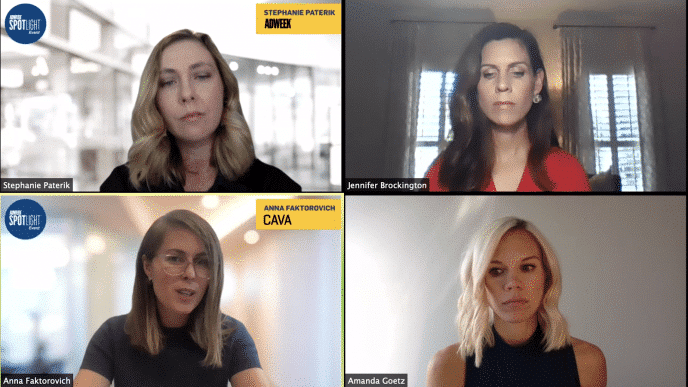
Focus For The Remainder of 2020
Since 2020 isn’t quite over yet, Paterik took an opportunity to ask each panelist what their professional focus is set on for the rest of the calendar year.
Goetz shared that at The Knot Worldwide, the holiday time is internally referred to as their super bowl, with over 40% of engagements happening between Thanksgiving and Valentine’s Day.
This year, Goetz shared, they’re expecting those engagements to be even higher. She shared:
“Our goal is to continue to be there where our audience needs us. Couples can plan their wedding digitally. We’ve introduced new features like video chats for vendors, 3D virtual tours, registries, etc. We have everything to meet people’s needs.”
She also shared that The Knot Worldwide views their job right now as making weddings now feel “normal and safe,” with creative measures like socially distant dance circles and crafty outdoor venues.
For Brockington and Ally, the rest of the year is all about access channels. She shared:
“We are in an era of mass digital empowerment—Ally was born that way. For us, it’s an opportunity for consumers to realize you probably haven’t been to a bank branch in quarantine. So, do you really need a bank branch? People will adopt new digital practices they never thought they would before.”
A Look Towards The Future
Paterik took an opportunity to share a quote here about having to live through these times in order to learn from them. And, with all panelists having now lived through this for the past six months, Paterik asks for some of these very learnings.
Faktorovich kicks off by sharing that even pre-pandemic, Cava guests lead digital lives. For thar reason, Cava remains focused on enhancing their digital experience and making it faster and easier to access Cava without sacrificing quality.
Brockington shares a nod to the competitive landscape of the future, pointing out that as companies figure out how to do business digitally, consumers may wonder if they can trust these new offerings. She explained:
“If your brand isn’t created out of a pain point, consumers are going to see through that. Consumers will have the key to the castle.”
Brockington also shared just how critical live sports typically are for Ally, and that they have pivoted that this year. She took time to point out the streaming and e-gaming opportunities that go beyond linear TV.
To wrap up their session, Paterik asked each panelist for their prediction in a word (or two).
For Brockington, that word was purpose.
For Goetz, it was connection.
For Faktorovich, her two words were suburban strength.
Striking A Brand Safety Balance
With 2021 just on the horizon, there was much more to cover, especially around the way brand safety has changed, and will continue to change. Here, Adweek Programmatic Reporter Ronan Shields entered, with a panel of his own to interview:
- Robin Shore: Senior Manager of Demand Partnerships at Taboola
- Jim Egan: Vice President of Publisher Development at Integral Ad Science
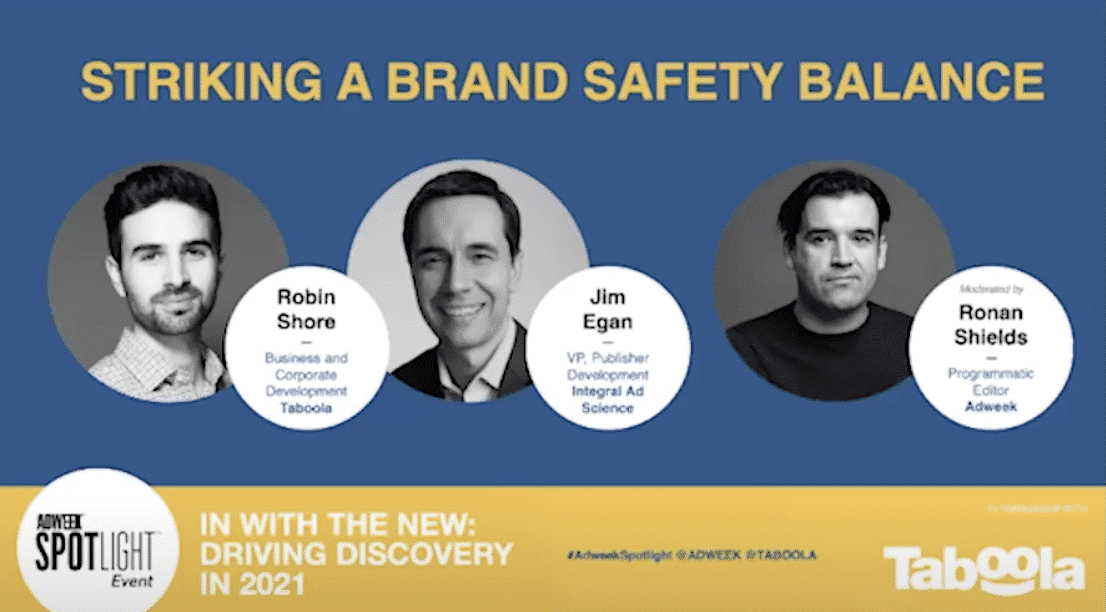
A Transformative Year, Indeed
Shields kicked off the conversation with a nod to what a transformative year it has been for brand safety. Between COVID-19, civil unrest, and a U.S. presidential election, he asked both panelists to talk the audience through what their respective companies had experienced.
Shore started by explaining that when the pandemic first began, there was an industry-wide knee-jerk reaction to pull spend driven by a combination of brand safety concerns and so much financial uncertainty, under which marketing budgets are often the first to head under the microscope.
Shore explained how this prompted difficult conversations, but it also prompted an opportunity to “slow down and re-center,” making way for important talks around brand safety.
Egan quickly agreed, saying:
“We found ourselves right in the middle of an unprecedented awakening––how brands, agencies, platforms, and publishers were defining and looking at brand safety. It was a pivotal moment.”
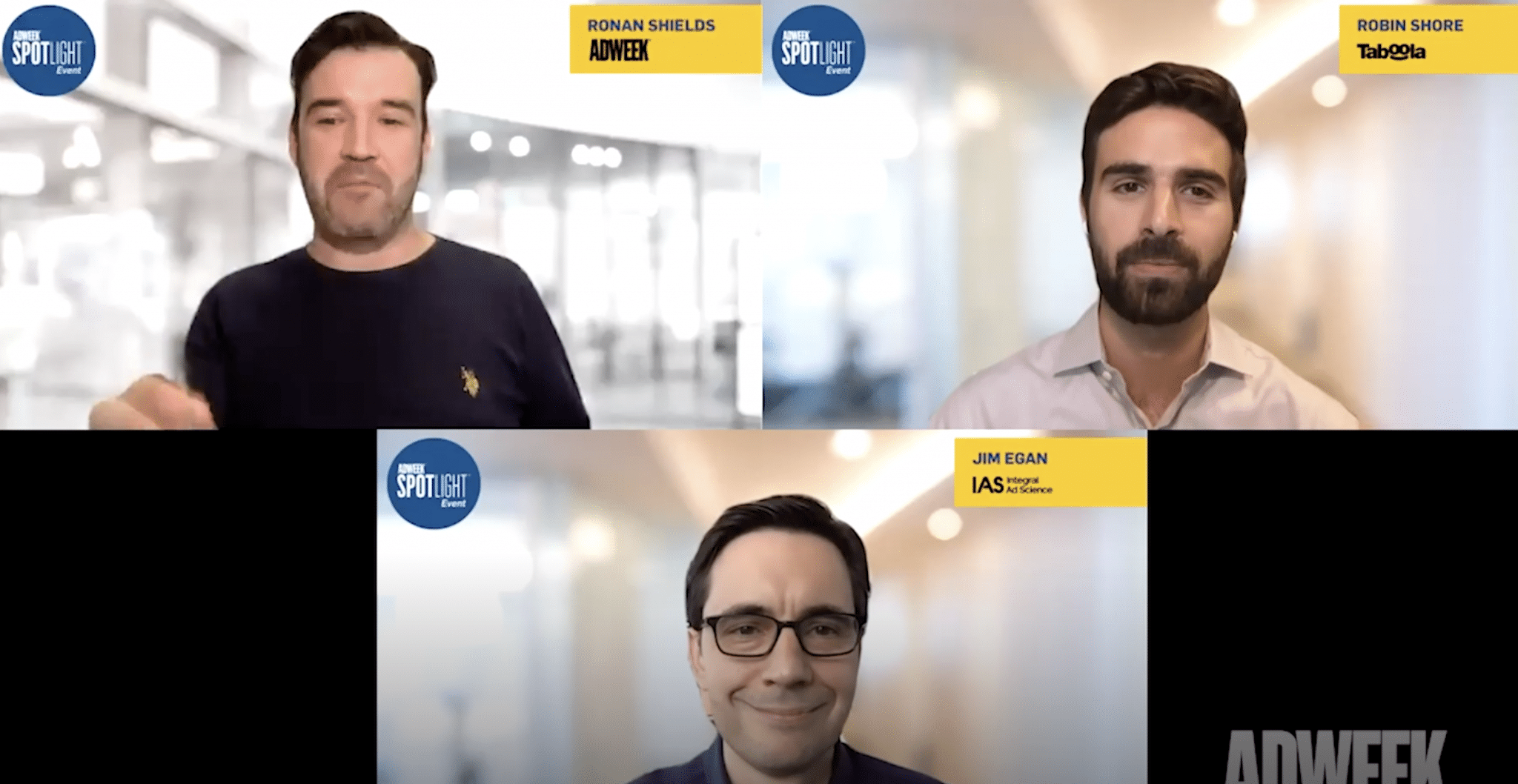
Not All Coronavirus Content Was Created Equal
Egan explained how IAS began working with marketers to help them understand that not all Coronavirus-related content was necessarily bad for brands. The shift called for solutions beyond antiquated keyword-based approaches to brand suitability, something that Egan shared, thankfully, IAS had already started working on.
“IAS’ largest investment in the past years has been around building out a contextual intelligence capability that goes beyond our historical brand safety capabilities. In addition to keywords, we’re now able to apply natural language processing to account for context, sentiment, and emotion.”
Shore agreed and acknowledged that while there was certainly negativity, there was uplifting news, too, sharing:
“It’s all about education and understanding the value of ad adjacency. There’s enormous value in being front and center.”
He mentioned Taboola’s work empowering publishers to have those conversations, too, and explained that Taboola has taken a good look at their vast amount of publisher data to further identify trends and opportunities.
So, What Have The Trends Been?
Shields opens the floor for both panelists to talk about some of the trends they’ve seen emerge, and new audiences they’ve seen since the start of the pandemic.
Egan points out that news environments house so many different types of content, and clusters developed around topics like health & wellness, recipes, or lifestyle that could take a topic like COVID but have a neutral or positive sentiment.
Shore shared two notable audience trends from Taboola: Home & garden content, and pet-related content.
A Look Ahead at The Future of Third-Party Cookies
Shields touched on a recent announcement from Google sharing that third-party cookies are, essentially, going away. He asked his panelists for their thoughts.
Shore shared a key piece of advice: start planning now. He continued:
“What are different channels doing to adapt to this? Ask the right questions of your vendors and partners to understand how they’re preparing. There will be a huge shift to more sophisticated contextual targeting and technology.”
Both Shore and Egan agreed that brand safety as table stakes has been long implemented, but over the last 12 months, specifically the last 6, there has been larger diversity amongst marketers investing in brand safety and asking questions that they hadn’t in the past.
Executive Fireside: Challenges, Changes, And Trends
To wrap up a riveting series of discussions, Adweek’s Editor and Senior Vice President, Lisa Granatstein, was joined by Taboola’s Founder & CEO, Adam Singolda, for a fireside chat.
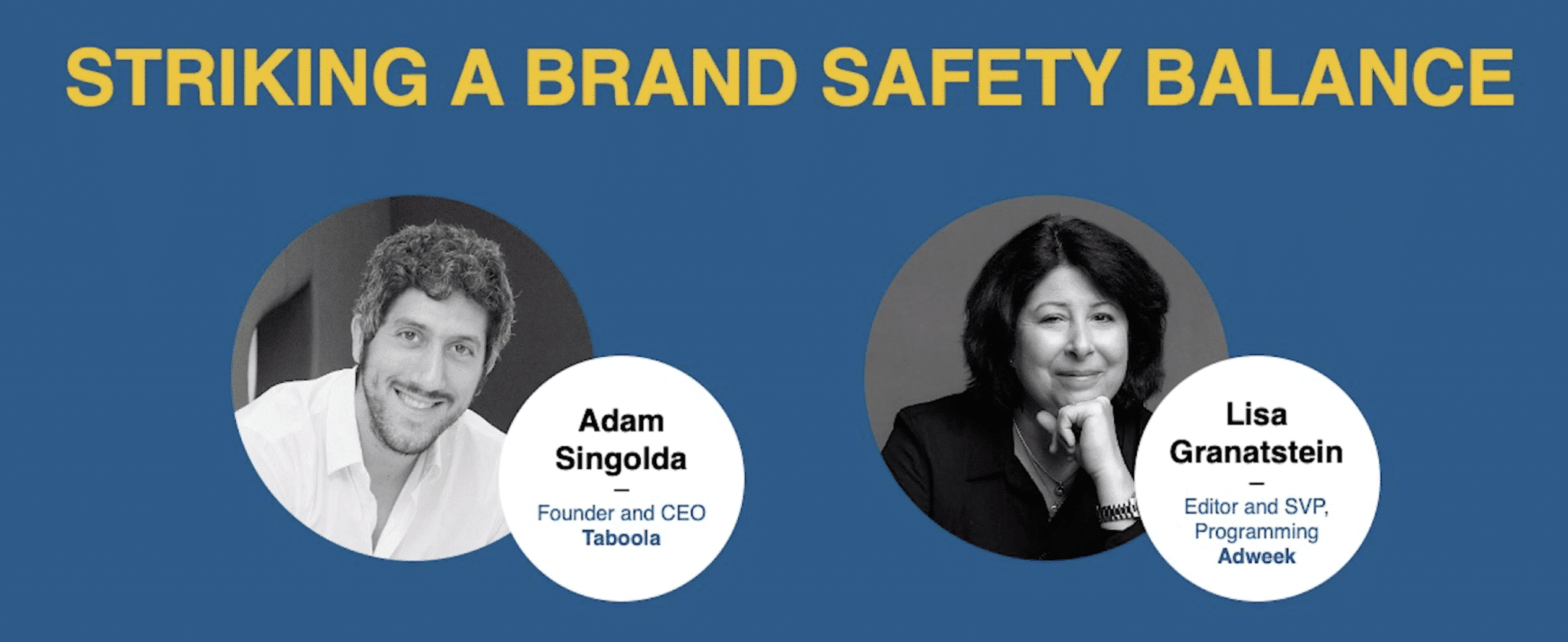
Innovation And The Industry
Kicking things off, Granatstein asked Singolda how the industry has been driving innovation these days.
After noting that the two speakers were actually supposed to be together on a SXSW panel this year (and noting that much has changed), Singolda shared that there are two sides to the shift.
“On one side, it’s weird to be working from home in this Zoom world. But on the other hand, there’s something special that happens when you have no other choice. As a global company, we suddenly became more efficient. It flattened the world and made us closer.”
Singolda also notes an early increase in advertisers for masks, and an unforeseen surge in readership around plumbing—just a few of the shifts Taboola has seen since the start of the pandemic. He also mentions banks, saying:
“For ages, credit cards were the front end product for banks, but during the pandemic, we saw that people were seeking out investment products. We recommended that banks change their messaging accordingly.”

What Challenges Did Publishers Face?
Granatstein turned the focus onto publishers, posing this very question to Singolda next. He responded:
“Publishers and advertisers both had so much uncertainty. How, and for what, do you plan? In these times, you tend to see people stop and look internally for answers, and we saw that across the board.”
Granatstein nodded in agreement, sharing that Adweek, a diversified business, shifted focus to subscriptions which grew nearly 50%, virtual events, newsletters, community building, and more.
“Trust has been a big thing,” remarked Singolda. “Nothing brings people together more than a mutual enemy, and this pandemic was an enemy for us all.”
The World of Content Moderation
Granatstein shifted gears next to talk about content moderation, noting that Taboola does not run political ads. She asked for Singolda’ take on social media channels, who do run these types of ads. Singolda noted that content moderation is a huge topic, replying:
“There is a fundamental question––do you believe AI can moderate content and do a great job at it, or do we need humans to solve a human problem? I believe AI is a huge revolution and it’ll be here forever, but a mistake could be too big. Racism, fake news, deceiving content—we need humans to solve human problems. My recommendation is that I would hire 50,000 people to moderate Facebook day in and day night and I would grow that team because it’s worth it.”
With this take on content moderation shared, Granatstein asked Singolda to turn inward, inquiring about Taboola’s own content moderation policy.
Singolda referenced two ways in which Taboola tackles content moderation. The first is having a public policy because, in Singolda’s words, “we want to be consistent.” He then dove into more detail, explaining:
“We also have a 50 person content review team reviewing 100% advertising on the Taboola network. That doesn’t mean we don’t make mistakes, we have plenty of challenges. But when we make mistakes we fix them, and we’re looking for topics that can hurt consumers and deceive them. It’s a very hard job reviewing thousands of pieces of content. Kudos to that team. I intend to double and triple down on that team.”
Granatstein then touches on the recent news of the Taboola and Outbrain merger talk ending.
Singolda gave context, explaining that it was “an incredible experience, and we made amazing friendships.”
“All the way to the end,” shared Singolda, “we planned how the new company would look and it was a once in a lifetime experience.” He explained how as the process went on for longer than anticipated and the pandemic hit, it became time to decide to renew or part ways. He noted:
“There were enough gaps between us that led us to choose to go separate ways. I think it was the right decision for both companies and both companies are in a good place.”
The Future Ahead
When Granatstein shifted focus to the future, Singolda said right away, “I’m convinced that news will be the glue between users and everything in the future.”
Granatstein asked for any future focus area within Taboola itself, and Singolda shared two:
“We’re looking at two big areas. One is our existing open web operation where we will do more with e-commerce opportunities, and more brand safety & transparency partnerships like with IAS. The second is how can we bring news anywhere people spend time, on every device. That will take us into the next decade. It’s a huge $100 billion market so we have a lot of work to do and grow and give back to publisher websites.”
The two speakers then took a moment to reminisce on the specialness of live events.
“Don’t you miss them?” asked Singolda.
“I miss not just the rosé, but the networking, too!” joked back Granatstein.
Singolda also noted that while virtual events continue to be more efficient and global, something is missing, and that’s serendipity––stumbling upon someone, getting coffee, and making a great friendship or partnership. “We all miss those connections,” remarked Singolda.
Granatstein wrapped up their time by asking Singolda how he feels heading into 2021.
“I’m optimistic. 2020 in a word would be perspective––re-thinking about everything we do, how we run our businesses, how we appreciate friendships. We all grew up a little bit. We got our priorities in order and became more efficient. We ask ourselves tougher questions. I think that will be an asset in 2021 and beyond. We will never forget 2020.“
We most certainly will not forget 2020, and we won’t soon forget the incredible panels and speakers who made this Taboola and Adweek virtual event so insightful.
